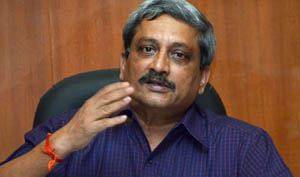Panaji, Oct 12: Incidents like the Dadri lynching "damage" the image of the NDA government and RSS has nothing to do with them, Defence Minister Manohar Parrikar has said.
 "These incidents damage the image of the NDA as well as the vision of Prime Minister Narendra Modi. It cannot be said to be the intention of the government," Parrikar said.
"These incidents damage the image of the NDA as well as the vision of Prime Minister Narendra Modi. It cannot be said to be the intention of the government," Parrikar said.
He was asked about the lynching of man over beef eating rumour in Dadri, Uttar Pradesh and whether such incidents were part of the RSS agenda to polarise society ahead of the Bihar polls.
He was speaking at a fund-raising function in Bambolim on the outskirts of Panaji on last evening.
"Sometimes local issues are blown out of proportion," he said insisting that he was not referring to any particular incident even as he called for exercising restraint on such issues.
Seeking to distance the Rashtriya Swayamsevak Sangh from the recent attacks in Uttar Pradesh, he said, "I have been a hardcore RSS functionary from my childhood. This (Dadri lynching) has nothing to do with RSS. Indian society is a tolerant and understanding society where solutions are reached through discussion and compromise."
"Violence of any nature cannot be accepted," he said.
The lynching of a 50-year-old Muslim man in Uttar Pradesh recently over beef rumours has led to national outrage with several writers returning their Sahitya Akademi awards over "rising intolerance."
When asked whether the demand for a countrywide ban on beef, as sought by Baba Ramdev, was being considered, Parrikar said, "Government decisions have to be fair to everyone."
"Some vegetarians may want the whole world to eat only veg. What will happen is there will be a spurt in prices of veggies that at one point even the vegetarians won't have vegetables to eat," the Union minister said.
To a question whether organisations like the Goa-based Sanatan Sanstha should be banned after they came under scanner for the killing of some rationalists, Parrikar said the investigating agencies would have to build a case against the organisation before such a ban.
"Like SIMI, the government would have to build a case against them to prove that the organisation encourages violence as a means of silencing those who hold a contrary view. Violence cannot be allowed in a democracy," he stressed.





Comments
Add new comment